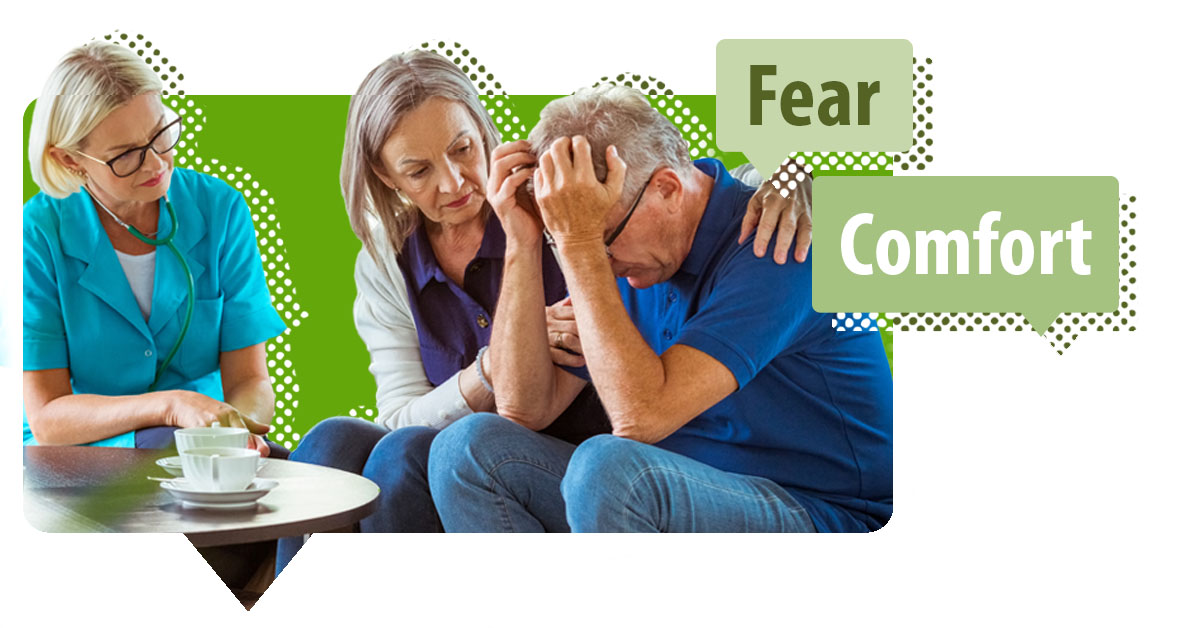
Dear Crossroads,
My husband is on palliative care and his health is steadily in decline. Every night I console him as he cries himself to sleep, expressing his fear of dying through the tears. He is absolutely devastated, as am I.
Recently, his doctor pulled me aside and recommended hospice care as a next step. But I know my husband is not ready for it. He equates hospice with impending death and he thinks he has so much more to get out of life. I just don’t think I’m ready to tell him because of how he might react.
What should I do when my husband is afraid of dying?
Thank you,
Scared Spouse
Dear Scared Spouse,
Thanks for reaching out. At Crossroads Hospice & Palliative Care, we understand how hard it can be to have these conversations, especially when it involves a loved one who is nearing end of life and feels like they’re running out of time. We are here for you both.
It seems to me that you may actually have two questions contained in your overall question. The first I sense is that your husband hasn’t had a straightforward conversation with his doctor. It would be helpful for the doctor to clearly articulate to you both the limits of the medical options available. It may be a hard truth to face, but this knowledge is critical to making any further decisions about transitioning to comfort care only. The fears are still going to be there, but whenever possible, we should be fully informed of the doctor’s perspective.
As a chaplain, I encounter many patients and their loved ones who are in your shoes. Many of them are afraid of death because they fear the unknown. I often hear them say how much they’ve enjoyed life and being with their family. They don’t want to leave them behind, and they’re afraid of this mysterious journey that they have to go on alone. Sometimes they are afraid of the dying process itself and wonder, “Will it be painful and how much will I suffer?” Other factors may be contributing to the feelings of fear.
During these conversations, I try to be honest and transparent and tell folks how everyone has fears, especially fears of being alone in their end-of-life journey. I suspect we all have that fear because none of us have been able to have a conversation with someone who has literally experienced death and come back to tell you what it’s like.
One of the biggest lessons I have learned from my patients is striving to listen without judgment. I know that can be easier said than done. Keep in mind that your husband’s fears are legitimate, and he shouldn’t feel bad about having them. Sometimes acknowledging the fear is the easiest thing you both can do. Once acknowledged, those feelings feel less like a steep mountain you have to climb. By slowly easing into these conversations, you can make space for the uncomfortable feelings and eventually they feel less scary.
Now, beginning the hospice conversation can also be challenging, so we at Crossroads can provide you with information to help guide those moments. It’s important to remember that there are still many great days ahead for you both. Unfortunately, some people still believe that when a patient starts hospice care, they’re going to die tomorrow. Yes, some may in more serious situations or as a result of waiting too long, but that’s usually not the case. Many of our patients begin to receive hospice care up to six months before death. Receiving hospice care means making the most out of the time you have left.
Once your husband begins his care, our team of doctors, nurses, social workers, chaplains, bereavement counselors, and volunteers will do everything possible to make you and him feel comfortable with this decision. To that end, we help navigate and manage the physical, emotional, spiritual, and psychosocial challenges and pains throughout end-of-life and beyond. When your husband passes, we’ll still be here to help you through what comes next.
When we identify that one of our patients is actively dying and passing is imminent, we activate Evenmore Care© – a service for someone in the last 12-24 hours of life. With this additional layer of support, we exhaust every effort to stay by their side. Our staff members will remain at your loved one’s bedside to make sure they are not alone. Evenmore Care is why Crossroads significantly exceeds the national average for attended deaths.
In my role as chaplain, I often sit with patients and talk with them to see if there is anything they want to clear from their hearts and minds. It’s their opportunity to share any secrets or set aside past grievances. I help them understand there’s ultimate forgiveness and they can let those things go. It can also be a time to help everyone say “Goodbye” and “I love you.”
As a chaplain, when I’m alone with a patient who is nearing end of life, I offer encouraging words, sing songs, or play soothing music. Sometimes I sit in silence or prayer. When asked by the family, I offer them to God’s hands, so that they might have final peace and that God provides strength to the family.
I hope you can see that by choosing Crossroads, you and your husband will never be alone throughout your end-of-life journey. Let us be there with you both.
Sincerely,
Christian Bennett
Chaplain
Crossroads Hospice & Palliative Care
For more information on hospice eligibility requirements, give us a call at 888-564-3405.
If you found this information helpful, please share it with your network and community.
Copyright © 2022 Crossroads Hospice & Palliative Care. All rights reserved.

